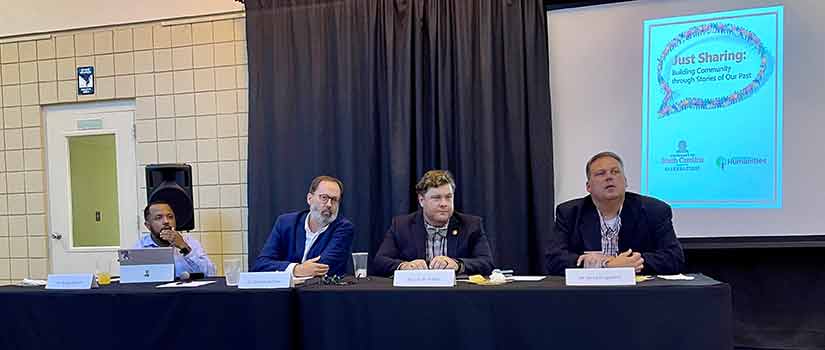The University of South Carolina Salkehatchie recently hosted the South Carolina Humanities Council Program: “Just Sharing: Building Community Through Stories of Our Past.” The program is part of a series of symposiums that will be held across South Carolina with a focus on enslavement, Reconstruction and civil rights.
By bringing together some of our state’s most accomplished scholars to share stories and to have a conversation about our state’s history, the program seeks to build community, understanding and healing. USC Salkehatchie and Allendale County hosted the first of these programs.
Each event hosts one scholar from the University of South Carolina, one from Clemson University, and another scholar with expertise in local history. Monday night’s symposium included Dr. Christian Anderson of USC Columbia, Dr. Otis Westbrook Pickett of Clemson University, and Dr. Ramon Jackson. Anderson’s address discussed the two distinct moments when the University of South Carolina was desegregated – first, for a brief period during Reconstruction and then permanently in 1963. Pickett traced the decades-long struggle for desegregation at the College of Charleston and the many figures who worked to erode the color barrier at the institution.
Jackson observed that South Carolina, even its rural reaches, is steeped in civil rights activism and has a rich history that is often overlooked. While reflecting on voting rights protests held at the Allendale County Courthouse in 1965, Jackson said that Allendale County’s civil rights efforts were integral to the statewide story. For Jackson, that stand for the right to vote is something to celebrate. And, Jackson issued a challenge: there is more local civil rights history to uncover and remember.
The symposium closed with a discussion among the panelists about how the past continues to influence present-day challenges in rural South Carolina. The session was moderated by Dr. David W. Dangerfield of USC Salkehatchie and was coordinated locally by Salkehatchie’s Dean of Campus Dr. April Cone and Anne Rice.
